Happy Friday! A programming note: We’ll be taking the Labor Day holiday off, so look out for our next issue next Wednesday as we prepare to power through the final weeks of the 2024 campaign. Enjoy the long weekend!
Up to Speed
- Former President Donald Trump and Vice President Kamala Harris have continued to feud in recent days over whether their microphones will be muted when they are not speaking during a September 10 debate on ABC News. Rules the network sent to the campaigns said the microphones would be muted, but Harris’ team, which is advocating for the microphones to be live the whole time, maintained those rules were a draft that both sides needed to agree on. The Harris campaign has latched onto a comment Trump made Monday in which he said he would prefer the microphones stay on while adding that he thought the rules should be the same as the June CNN debate between him and President Joe Biden, in which one participant’s microphone was muted when the other was speaking. “Our latest understanding is that even though Trump said Monday he would be fine with an unmuted mic, his handlers don’t trust him to spar live with VP Harris and are asking ABC to ignore Trump’s comments and keep the mics muted or else they will back out of the debate for a third time,” Harris senior adviser Brian Fallon tweeted on Thursday.
- Meanwhile, details of a dispute that occurred Monday between Trump campaign staffers and an Arlington National Cemetery employee slowly came to light as the week progressed. An Army spokesman released a statement Thursday saying there was a physical altercation between Trump’s team and a worker who tried to enforce laws against campaign activities at the cemetery while the former president visited to honor the memory of the 13 service members who died in Biden’s much-derided withdrawal from Afghanistan. “Participants in the August 26th ceremony and the subsequent Section 60 visit were made aware of federal laws, Army regulations and DoD policies, which clearly prohibit political activities on cemetery grounds,” the spokesman said, referencing a part of the cemetery where soldiers recently killed in combat are buried. “An ANC employee who attempted to ensure adherence to these rules was abruptly pushed aside.” The Army added that the employee did not press charges, so it considered the matter closed. The Trump team has insisted it violated no laws, and members of the campaign have called the employee a “despicable individual” and alleged that she was having a “mental health episode.”
- Polls, polls, and more polls: Emerson College and The Hill released a new tranche of swing-state surveys on Thursday that shows as tight a race as ever between the Democratic and Republican nominees. Trump leads Harris in Arizona, North Carolina, and Wisconsin, with Harris ahead of Trump in Georgia, Michigan, and Nevada. Both are tied at 48 percent in Pennsylvania—but with neither candidate leading the other by more than 3 points in any of the seven battleground states and with all of the results within the polls’ margin of error, it’s more accurate to say Emerson found them effectively tied in each swing state.
- The day before, Fox News released its own poll showing similarly narrow margins between Trump and Harris in some of the key swing states in the Sun Belt. The poll found Harris leading Trump by 1 point in Arizona and by 2 points in Georgia and Nevada, with Trump leading Harris by 1 point in North Carolina—a big boost for the Democratic nominee after previous Fox News polls found President Joe Biden, when he was running, trailing Trump in those states, and by significant numbers outside the margin of error.
- In the same poll, Fox News also found Democratic Senate candidates in two of those swing states far outpacing their Republican rivals. Democratic Rep. Ruben Gallego was at 56 percent to Republican Kari Lake at 41 percent in Arizona, while Democratic Sen. Jacky Rosen led her Republican challenger, Sam Brown, 55 percent to 41 percent. Meanwhile, in the North Carolina governor’s race, Democrat Josh Stein led Republican Mark Robinson 54 percent to 43 percent.
- The National Republican Congressional Committee on Wednesday announced ad reservations to help Rep. Zach Nunn in Iowa’s 3rd Congressional District and former Rep. Mayra Flores, who is challenging Rep. Vicente Gonzalez in Texas’ 34th District. Of the $1.52 million total spend, $800,000 will go to help Flores and $720,000 will support Nunn. This week’s spending comes on the heels of a $45.7 million investment from the committee’s independent expenditure team back in June.
Harris Finally Speaks for Herself
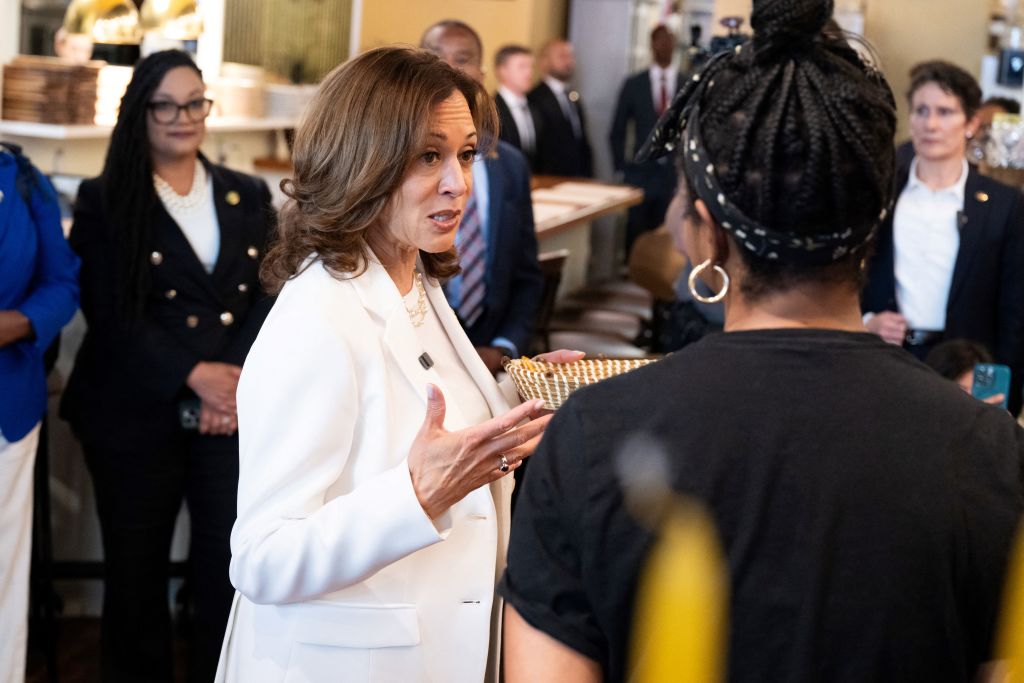
As a political matter, Kamala Harris’ first sit-down interview as the Democratic nominee for president might not have been a home run—but it wasn’t a strikeout, either, doing nothing to meaningfully change the trajectory of the race. The vice president was competitive with Donald Trump and within striking distance of the White House on Thursday morning, and she remains so 24 hours later.
The televised conversation, a joint interview on CNN with Harris’ running mate, Minnesota Gov. Tim Walz, was useful in a different way, exposing a couple of unique political challenges confronting the vice president over the next nine-and-a-half weeks. Harris is seeking both to claim the mantle of change and, in her words, “turn the page” on a presidential administration and political era in which she has been an active participant. In doing so, she’s attempting to shed a progressive past and recast herself as a consensus pragmatist.
“I am so proud to be running with Tim Walz for president of the United States and to bring America what I believe the American people deserve, which is a new way forward, and turn the page on the last decade of what I believe has been contrary to where the spirit of our country really lies,” Harris, 59, said at one point, prompting the network’s chief political correspondent, Dana Bash, to counter: “The last three-and-a-half years has been part of your administration.”
“I’m talking about an era that started about a decade ago,” Harris insisted, “where there is some suggestion, warped I believe it to be, that the measure of the strength of a leader is based on who you beat down instead of where I believe most Americans are, which is to believe that the true measure of the strength of a leader is based on who you lift up. That’s what’s at stake as much as any other detail that we could discuss in this election.”
The primetime Thursday interview also forced Harris, for the first time since becoming the Democratic standard-bearer nearly six weeks ago, to contend with her shifts on key issues—away from the progressive positions she held as a senator from California and 2020 presidential candidate, toward the political center. Until now, the vice president has allowed campaign aides to walk this tightrope for her.
To review: During the vice president’s four years in the Senate, before President Joe Biden tapped her as his running mate in 2020, and while campaigning for the Democratic nomination that year, Harris was a staunch environmentalist. She supported the so-called Green New Deal and opposed fracking, a form of fossil fuel exploration. Now in a dogfight with Trump, especially in must-win Pennsylvania, a state where the energy industry is a major economic driver, Harris has embraced fracking.
“Do you still want to ban fracking?” Bash asked. Harris responded: “No, and I made that clear on the [vice presidential] debate stage in 2020, that I would not ban fracking. As vice president, I did not ban fracking. As president, I will not ban fracking.” Bash pressed, leading the vice president to argue: “In 2020 I made very clear where I stand. We are in 2024, and I have not changed that position, nor will I going forward. I kept my word, and I will keep my word.”
The Democratic nominee proceeded to explain that “my values have not changed”—a line that has generated media coverage, and that Republicans are sure to highlight in advertising critical of her record. But perhaps more interesting, and potentially consequential, was Harris’ attempt to wrap her 2024 candidacy in the politics of consensus. Once standard fare in American presidential campaigns, it marks a departure from the base politics that has dominated these contests since 2012.
“I believe it is important to build consensus, and it is important to … find a common place of understanding of where we can actually solve problems,” Harris said, capping a lengthy and somewhat stilted explanation for why she jettisoned positions on illegal immigration that deemphasized border security. “We have laws that have to be followed and enforced that address and deal with people who cross our border illegally.”
Meanwhile, Harris was compelled to address the circumstances surrounding her unlikely candidacy: Biden’s age and infirmity. The 81-year-old president dropped his reelection bid in late July after a disastrous June 27 debate with Trump crystallized voters’ concerns about both, a prospect that would have made it exceedingly difficult for the incumbent to defeat the former president in November. Republicans argue that Harris was covering for Biden and owes voters an explanation. Asked by Bash if she has “any regrets,” the vice president quickly answered “no.”
“Not at all. Not at all,” Harris said. “I have served with President Biden for almost four years now. And I’ll tell ya it’s one of the greatest honors of my career, truly. He cares so deeply about the American people. He is so smart and — and loyal to the American people. And I have spent hours upon hours with him, be it in the Oval Office or the Situation Room. He has the intelligence, the commitment, and the judgment and disposition that I think the American people rightly deserve in their president.”
Harris does seem to have mastered one aspect of the presidential interview format in the age of Trump. For the past nine-plus years, since he launched his first presidential campaign, Trump has managed to keep Democratic and Republican opponents off balance with provocative attacks that consume their attention and keep them, and the media focused almost solely on him. To wit, Bash asked Harris to address Trump’s unsubstantiated and untrue claims that the vice president—whose mother emigrated to the United States from India and whose father hailed from Jamaica—never identified as black until recently.
“He suggested that you happened to turn black recently for political purposes, questioning a core part of your identity,” Bash said. Harris’ response? “Same old, tired playbook. Next question, please.” Bash, seeming somewhat surprised, followed up: “That’s it?” Harris didn’t budge. “That’s it.”
Trump’s Shifting Position on Abortion Bewilders Pro-Life Supporters
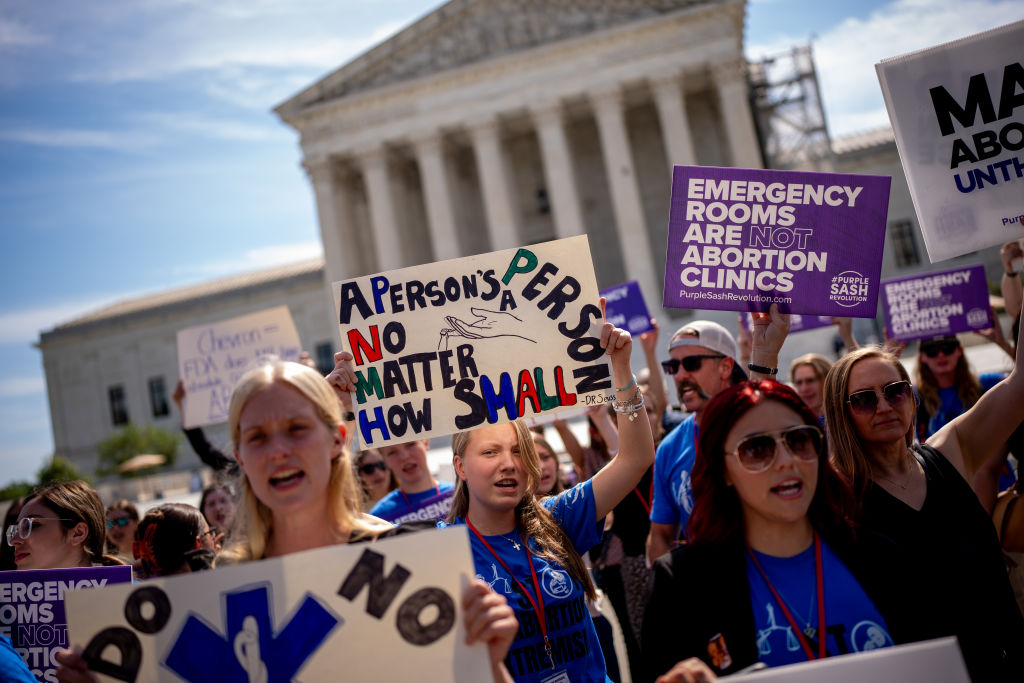
In Michigan on Thursday, former President Donald Trump promised to subsidize or mandate insurance coverage for in vitro fertilization treatment and suggested he would vote for a ballot measure in his home state of Florida that would overturn the state’s ban on abortions after six weeks of gestation.
“I think the six-week is too short. It has to be more time, and I’ve told them that I want more weeks,” Trump told NBC News during an interview before a campaign event in Potterville, southwest of Lansing. He was pressed on how he would vote on the ballot measure, which would amend the Florida constitution to protect the right to abortion before fetal viability but contains broad exceptions that some have claimed could allow abortion through all nine months. The Republican nominee replied he would “be voting that we need more than six weeks.” A Trump campaign adviser later said that the former president had not said how he plans to vote on the measure, but that “he simply reiterated that he believes six weeks is too short.”
In the same interview with NBC News, Trump repeated what he first told the Detroit News – that under his administration, the government would pay for any American’s IVF treatments. He later said at his campaign event that either the federal government would pay “or your insurance company will be mandated to pay” for the fertility treatments.
Both answers reflect how, in the last week, Trump has shifted left on abortion and reproductive health rhetorically—even as social conservatives within the GOP coalition register their frustration with this turn from the party’s standard-bearer.
A week ago, Trump posted on Truth Social that his administration “will be great for women and their reproductive rights,” employing language usually used by abortion-rights advocates. Later that day, he reiterated his months-old belief that policy questions about abortion should be decided by states. And on Sunday, Trump’s running mate J.D. Vance told Kristen Welker on NBC News’ Meet the Press that Trump would veto a national abortion ban if one made it to his desk.
“He would not support it. … If you’re not supporting it as the president of the United States, you fundamentally have to veto it,” Vance said. Welker then pressed him on whether Trump would exercise a veto, and Vance replied, “I think he would. He’s said that explicitly, that he would.” Indeed, Trump said back in April that he would not sign a federal abortion restriction. That comment came just after he formally adopted his position of leaving abortion to the states, which made it into the GOP’s 2024 platform.
Public support for legal access to abortion has been on the rise since the Supreme Court overturned Roe v. Wade in 2022. Democrats have said for months they believe abortion could be a winning issue for them, and the party’s nominee, Kamala Harris, is warning voters that Trump would sign a national abortion ban if elected. This shift in how Trump and Vance speak about abortion may reflect anxiety about the ticket’s vulnerability on the issue.
“I think the campaign clearly sees polling on the issue that concerns them, but the approach seems to be improvisational in a way that could alienate more committed pro-life voters than [voters] they might gain through this shift,” Erick Erickson, a Georgia-based conservative radio host, told Dispatch Politics.
But this rhetorical change has drawn the attention of some of the party’s most prominent pro-life voices, including Trump’s former vice president, Mike Pence. “I’m pro-life. I don’t apologize for it,” read a graphic Pence tweeted Friday morning. The recent comments from Trump and Vance also have reignited an ongoing debate among pro-life activists over whether those who oppose abortion can support the Republican ticket.
After Trump adopted his “leave it to the states” prescription earlier this year, Lila Rose, a prominent abortion opponent and the founder of the nonprofit group Live Action, said that pro-life support “will not materialize in 2024 if President Trump holds to this anti-human and cowardly position.” And when Vance reiterated his running mate’s opposition to a federal abortion ban this week, Rose made a similar declaration.
“Due to their increasingly pro-abortion position, Trump/Vance is stretching the lesser of two evils voting strategy to an untenable position,” Rose tweeted. “Without some indication that they will work to make our nation a safer place for preborn children, they are making it impossible for pro-life voters to support them.”
On the other side of the question is Students for Life President Kristan Hawkins, who has said her organization had “work to do to educate the Trump Administration to come on the many ways that abortion has been made federal.” Hawkins has nevertheless reaffirmed her support for Trump, citing Democrats’ alleged desire to have “abortion without limits” and use taxpayer funding for the procedure while blocking medical care for babies who are born as the result of failed abortions. “Fighting against that kind of abortion extremism is a reason to vote for Donald Trump,” she said.
Hawkins strongly condemned Trump’s Thursday comments while still reiterating her support for the GOP nominee.
“So, President Trump clearly doesn’t want to be pro-life anymore. Got it. Pro-lifers are being screwed. We need to demand Trump re-consider,” she posted on X. “But don’t let this screw the babies we are fighting for. Vote against Kamala Harris.”
But the backlash is real in swing states among pro-life voters against Trump’s pro-choice turn, said Cole Muzio, president of the Georgia-based Frontline Policy Council, a pro-family and socially conservative organization. Enthusiasm for Trump is depressed, Muzio told Dispatch Politics, and some onetime supporters are even promising to stay home or not vote in the presidential election. He added that in a state like Georgia, where the previous presidential election was decided by fewer than 12,000 votes, it makes a difference if pro-life voters are less willing to encourage their friends on Facebook to vote or talk about politics after Sunday school.
“I’m hearing from people anecdotally that they’re done. They’re washing their hands,” Muzio told Dispatch Politics. “If the preservation of life is your number one issue, what Donald Trump has said over the last month is driving you away from the polls and to your couch.”
Notable and Quotable
“My wife the English teacher told me my grammar’s not always correct. But again, if it’s not this, it’s an attack on my children for showing love for me, or it’s an attack on my dog. I’m not gonna do that, and the one thing I’ll never do is I’ll never demean another member’s service in any way. I never have and I never will.”
—Minnesota Gov. Tim Walz, responding to a question during a CNN interview about his previous claim that he carried weapons of war “in war” when he never deployed to a war zone, August 29, 2024



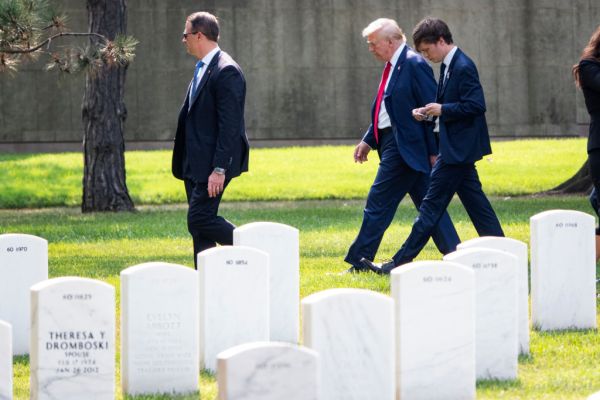
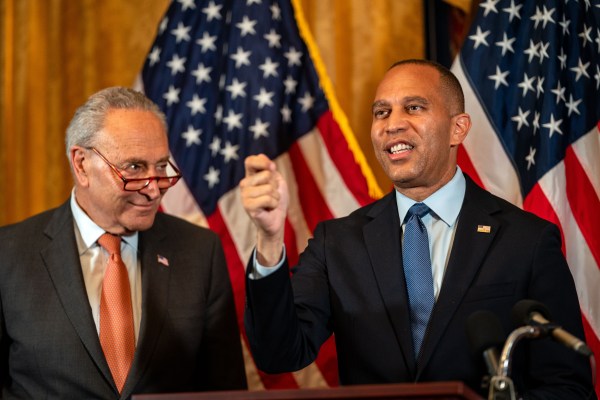
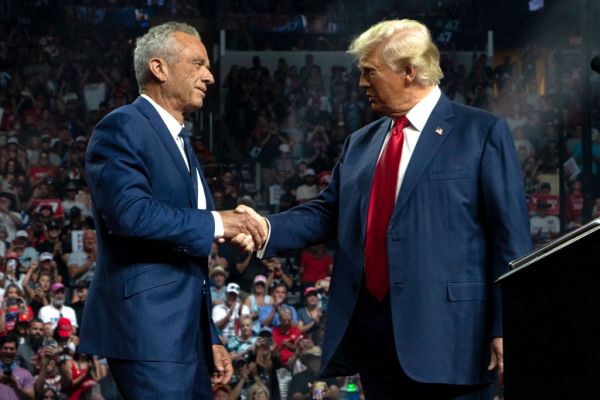

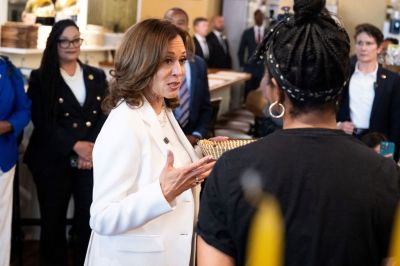
Please note that we at The Dispatch hold ourselves, our work, and our commenters to a higher standard than other places on the internet. We welcome comments that foster genuine debate or discussion—including comments critical of us or our work—but responses that include ad hominem attacks on fellow Dispatch members or are intended to stoke fear and anger may be moderated.
With your membership, you only have the ability to comment on The Morning Dispatch articles. Consider upgrading to join the conversation everywhere.